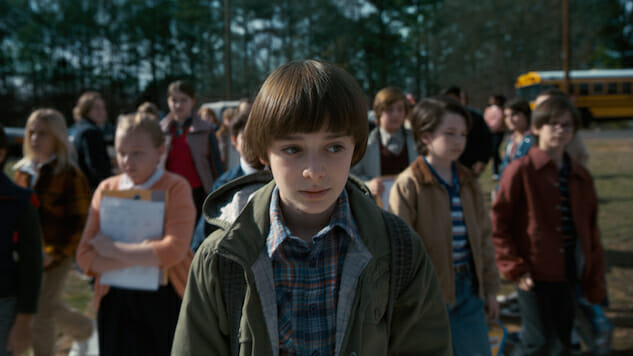Stranger Things Creates a New Kind of Nostalgia in the Season Two Premiere
(Episodes 2.01 and 2.02)
Photo: Courtesy of Netflix
This review contains spoilers from the first two episodes of Stranger Things Season Two.
Fear not, those of you who were turned off by the first season of Stranger Things’ overwhelming reliance on references to 1980s pop culture (even though you reluctantly watched through its conclusion because you’re weak): Season Two is built of hardier stuff. The first run used its affection for Steven Spielberg to explore themes he adored in his work, like loss and grief, especially when there exists a cavern between the imaginations of those experiencing them.
When people have different tolerances for the fantastic, they cope in different ways, which can make a fundamental divide in society between the open- and closed-minded. Now that the loss and grief has been experienced and, to some extent, overcome, Stranger Things shifts its purpose, offering the same characters dealing with the aftereffects of trauma. One year after the events of the first season, with psychic wunderkind Eleven (Millie Bobby Brown) still vanished, friends Mike (Finn Wolfhard), Dustin (Gaten Matarazzo) and Lucas (Caleb McLaughlin) are reunited with Will (Noah Schnapp, who I’m glad is awake, because the kid is quite the vulnerable little actor) and are attempting to return to normalcy.
That would be all well and good, but then there’s the a cold open promising another numbered X-Kid warping the mind of a cop after a brief but well-shot car chase. The far-reaching impact of the Department of Energy’s experimentation may not be as pressing an issue as Will’s PTSD or the slow-burn stress suffered by Joyce (Winona Ryder) and police chief Jim Hopper (David Harbour), but it’s always in the background, promising more science fiction than the city of Hawkins is ready for.
Throughout the first two episodes, “Madmax” and “Trick or Treat, Freak” (of which the latter is stronger), this promise remains a brief and not-quite-tantalizing-enough innuendo. Instead, both focus on the altered relationships between the characters—during the lead-up to Halloween—that the past year’s toll has wrought. This isn’t solely the impact of what Will went through in the Upside Down; it’s also the minor childhood trauma of losing a close friend when they move away. Mike’s kept Eleven’s secret bedroom hovel intact since she vanished, but this devotion represents a loss that has externalized over the past year.
Mike has become a bit of a rebellious dick, lashing out and adopting some bad boy behavior (or at least bad in comparison to his cadre of nerds); Will has kept quiet, weathering his flashbacks with the same cycle of stoicism and breakdown as combat veterans; and Dustin and Lucas have bonded together, using each other as a support system and arcade games (and a crush on the new girl in town) as an escape. Max (Sadie Sink), said new girl—who kicks everyone’s ass at Dig Dug—add a tiny amount of estrogen to the proceedings while Eleven is away from the group. She accompanies the boys out trick-or-treating, after some surprisingly fun ribbing about the racial politics of group Ghostbusting leads to a hilarious situation bolstered by Matarazzo’s morose delivery.
-

-

-

-

-

-

-

-

-

-

-

-

-

-

-

-

-

-

-

-

-

-

-

-

-

-

-

-

-

-

-

-

-

-

-

-

-

-

-

-








































